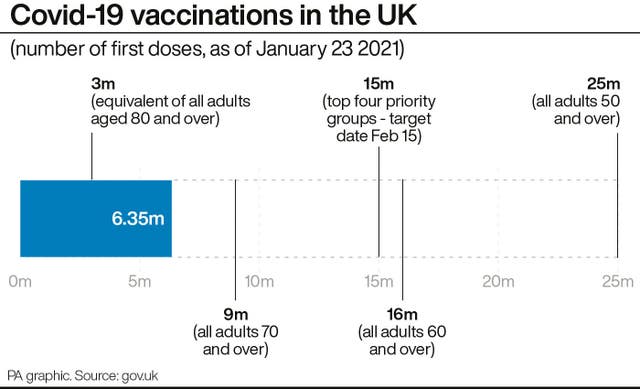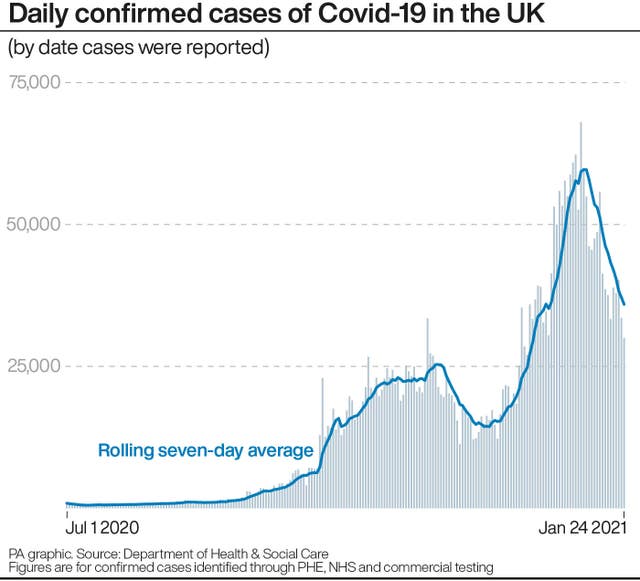Health Secretary Matt Hancock has warned the lifting of lockdown rules in England remains a “long, long, long way” off despite another record day in the rollout of the vaccine programme.
Government figures showed 491,970 people across the UK received their first dose on Saturday, taking the total to more than 6.3 million.
Mr Hancock said they included three-quarters of all over-80s and a similar proportion of elderly care home residents.
It suggests the programme is on course to meet Boris Johnson’s target of getting the jab to 15 million of the Government’s top priority groups – including all over-70s – by mid-February, provided supplies of the vaccine can be maintained.
Based on the latest figures, an average of 393,031 first doses of vaccine would be needed each day in order to get there.
Some Tory MPs have been looking to early March – once the effects of the vaccine have had a chance to kick in – as a date when restrictions could begin lifting.
Yesterday, 491,970 vaccines were administered across the UK, taking the total number of first doses to 6,353,321 🇬🇧
As we accelerate the vaccine roll-out, it's vital we all stay at home to suppress this virus.
We will get through this, together.https://t.co/o46oqJ1Ls5 pic.twitter.com/Vz3aRX7kuF
— Matt Hancock (@MattHancock) January 24, 2021
However Mr Hancock said that while the vaccination programme was making “brilliant progress” it was too early to consider any relaxation with the NHS still under intense pressure from the Covid case numbers.
“There is early evidence that the lockdown is starting to bring cases down but we are a long, long, long way from being low enough because the case rate was incredibly high,” he told Sky News’s Sophy Ridge On Sunday programme.
“You can see the pressure on the NHS – you can see it every day.”

Mr Hancock said that while he hoped schools in England could reopen by Easter, it would depend on the levels of infection in the community at that time.
“We have got to look at the data, we have got to look at the impact of the vaccination programme,” he said.
“The Education Secretary (Gavin Williamson) has said that we will ensure schools get two weeks’ notice of return. I don’t know whether it will be then or before then. We have got to watch the data.”
Following the emergence of new variants of the virus in Brazil and South Africa which may be less susceptible to the vaccines, Mr Hancock said the Government would adopt a “precautionary” approach to protecting the UK’s border.
Ministers are expected to meet this week to discuss a proposal to require people arriving in the UK to pay to quarantine in a designated hotel to ensure they are following the rules on self-isolating.
Mr Hancock said that so far there were 77 known cases of the South African variant in the UK and nine of the Brazilian. He said that all the cases of the South African variant were linked to travel.

“There is not what we call community transmission where you find a case that you can’t find the link back to travel. At the moment it is all linked to travel,” he told BBC One’s The Andrew Marr Show.
He said the new variants had been identified because both Brazil and South Africa had “decent-sized” genomic sequencing programmes but other countries were less well covered.
“The new variant I really worry about is the one that is out there that hasn’t been spotted,” he told Sky News.
“There’s probably those elsewhere that simply haven’t been picked up because the country doesn’t have that genomic sequencing service.”
Meanwhile a senior Government adviser on vaccines defended the decision to extend the gap between the delivery of the first and second doses to 12 weeks.
The British Medical Association has written to the chief medical officer for England urging a rethink, saying that in the case of the Pfizer-BioNTech vaccine a maximum gap of six weeks had been mandated by the World Heath Organisation (WHO).
However Professor Anthony Harnden, deputy chairman of the Joint Committee on Vaccination and Immunisation (JCVI), said there was “no real evidence” that a quicker follow-up dose was more effective.
“We do believe you should have a second dose but we do believe that that can be delayed,” he told Sky News.
“Hopefully, not only will this strategy get more people immunised and protect the vulnerable elderly and save thousands and thousands of lives, it may in the end give protection to the population as a whole.”




Comments: Our rules
We want our comments to be a lively and valuable part of our community - a place where readers can debate and engage with the most important local issues. The ability to comment on our stories is a privilege, not a right, however, and that privilege may be withdrawn if it is abused or misused.
Please report any comments that break our rules.
Read the rules hereLast Updated:
Report this comment Cancel